- Home
- Elmore Leonard
Escape From Five Shadows Page 7
Escape From Five Shadows Read online
Page 7
“Just tell me if you did.”
“Of course not!”
“Chick, I don’t care if you did.”
“Maybe he saw us talking.”
Bowen nodded. “Or maybe you suggested he try it.”
“I might have done that.”
“Then told him I was going to.”
“Why would I do that?”
“Chick, I’m not holding it against you if you did. I just want to know.”
“I might’ve mentioned you were thinking about it.” Chick Miller shook his head then. “But I wouldn’t have come right out and told!”
The Mexican, a young, clean-shaven, dark-skinned man, said, “That’s why I don’t even think about it. You get it in your mind to run and everyone knows about it.”
Chick Miller looked at the Mexican. “You keep out of what don’t concern you.” He stopped then, seeing Brazil riding toward them.
Brazil pulled up, his Winchester across his lap and pointing at them. “Just passing the time of day?”
Chick Miller grinned. “We’re waiting for the axe crew to give us some work.”
Brazil nodded to a tree stump just beyond them. “There’s one left from Saturday. Start on it.”
“That one won’t be in the roadway,” Chick Miller said.
Brazil studied him. “You going to argue over it?”
“I just thought, why pull her out if she’s going to be off the road anyway.” He saw Brazil start to dismount and the half-smiling, squinting expression came over Chick’s face. “I mean it’s not going to be in the way.”
Brazil swung down and started for him. He waved the barrel of the Winchester at the other three men and said, “Get out of the way,” not taking his eyes from Chick.
“We’ll take her out,” Chick said. He glanced at the Mexican, seeing him move away; then to Bowen and Pryde who were watching Brazil and now he saw them back away slowly. As he turned to Brazil again the Winchester barrel was swinging toward him. He threw up his arms and fell back stumbling but keeping his feet and the barrel slashed past his head. Chick started to run.
“Stand where you are!”
He stopped, but seeing Brazil coming toward him again, began to back away.
“I said stay where you are!”
Chick held up his hand. “I don’t want to get hit. Listen, we’ll pull the stump. Just let me get my shovel.” His extended hand pointed. “I dropped it over there.” His eyes opened wide as Brazil moved toward him and at that moment he turned to run, taking one stride as the rifle barrel slammed across his back and he went down covering his head with his arms.
Brazil looked down at Chick, then turned from him. “Now pull the stump,” he said.
The Mexican went to Chick and kneeled over him. Bowen watched Brazil mount and ride down canyon. There, twenty yards ahead of them, a half dozen convicts were clearing the pinyon clumps: cutting the trees close to the ground, but leaving enough stump for the chain to be wound around and fastened to securely.
As the Mexican helped Chick to his feet, Pryde and Bowen walked over to them. Pryde asked, “How are you?”
An exaggerated expression of pain was on Chick’s face. “He’ll be sorry he did that.”
Pryde shook his head. “When the time and the day comes, you’ll be second in line. I got first dibs on Mr. Brazil.”
The Mexican was looking at Pryde. He smiled then. “If that day ever comes, I hope I’m there to see it. When you’re through with him, maybe I’ll kick him in the face.”
By noon, they were not more than a hundred yards farther down the canyon. The convicts worked as slowly as Renda would let them, knowing that he wanted to stretch the job time for all it was worth. Still, two or three times a day Renda would conscientiously speed up the work pace, as if rebelling against this one small advantage they held over him.
The clearing crew would cut down the pinyon and large mesquite bushes, drag them to the side of the canyon and burn them. The stump-pulling crew followed—digging under the shallow-rooted pinyon stumps, looping the chain about the trunk stub, levering with the shovel and finally pulling it out with the wagon team. One of them would drag the stump to the nearest fire as the others went on to the next stump.
Two guards watched the clearing crew because there was usually thick brush ahead of them. From the east side of the canyon, Brazil watched the group Bowen was with and most of the time Brazil did not leave the thin strip of shade close to the slanting talus wall.
Behind them came the pick-and-shovel crew—filling the stump holes from “borrow pits” along the side of the road, breaking stones, clearing the small mesquite bushes and the yellow-blazing patches of brittlebush, raking them over to the bonfires.
The scraper came next—two timbers bolted together and pulled by a wagon team. Six men, Manring one of them, stood on the timbers to add weight. The scraper bumped along over the roadway, the convicts losing their balance, jumping off and on, and every ten or fifteen feet the team was pulled off to the side, dragging with it the loose rocks and sand that the timbers gathered.
Two men with shovels came last—filling the potholes that the scraper passed over and did not fill completely. Renda stayed even with them, walking his horse along the east-wall shade approximately one hundred feet behind Brazil.
The Mimbreños were up on the canyon patrolling along both sides. They remained in the shadows of the pinyon pines and were not seen all morning, not until Renda stopped work at noon.
As the convicts drifted over to the east wall where the equipment wagon stood, Salvaje and two of his Mimbres came down a shallow wash, a dust cloud trailing behind them. They were riding past the equipment wagon when Renda called to them and they pulled up. The two Mimbres sat their horses, motionlessly watching Salvaje rein toward Renda who was now facing the convicts grouped at the back end of the equipment wagon. He pointed to Bowen, Pryde and the Mexican. “You three step out,” he called. Then turned to Salvaje again. “You’re going to the creek?”
The Mimbreño nodded and held up three fingers. “That many at a time.”
“Take these men with you,” Renda said. “They’re going to water the teams.”
The Mimbres moved off one at a time as each pair of horses was brought out. Salvaje waited until Bowen came up, then fell in next to him and they moved the team down the canyon, winding through the scattered scrub brush to a stand of sycamores that showed darkly against the west slope. A trickle of water came down from the rocks and formed a shallow pool in the deep shade of the trees. From here, the creek flowed to the end of the canyon, disappeared into the rocks and came out again miles to the south, above the Pinaleño station.
They drank: the convicts first, the Mimbres one at a time, and now they rested as the horses stood over the clear, sand-bottomed pool, their muzzles touching the water, rippling the water with breath from their nostrils, raising and shaking their manes, tails fanning lazily and now and again a rump or flank quivering to dislodge an unseen something.
Salvaje touched Bowen’s arm. “But for the work of getting more horses, I wish you would run away another time.”
Bowen frowned. “I don’t understand.”
“That was a good thing with you in the meadow,” Salvaje explained. “But the two horses you killed I was made to replace.”
“Renda made you buy two horses?”
Salvaje shrugged. “Not buy; but it is the same thing.”
“You’d think he’d supply the horses,” Bowen said.
Salvaje shook his head. “He is not easy to live with. Sometimes I see him as an escaped man. If he was ever that, he would not be brought back alive.”
Bowen hesitated. The Mimbre’s words took him by surprise and stayed in his mind as he said, “You speak English very well.”
“From San Carlos.”
“I visited Cibucu many times,” Bowen said. “When I was trading horses. I knew Zele and Pindah and Bu-sikisn.”
Salvaje’s eyes came alive. “They were of Vic
torio.”
Bowen nodded. “I drank tulapai with Zele and he told me much about Victorio and old Mangas.”
“Perhaps I was there then,” Salvaje said.
“They spoke of a band still in the Sierra Madres,” Bowen said. “Maybe you were there.”
Salvaje nodded thoughtfully. “The good days. At San Carlos it was not easy to live among Tontos and Mojaves.”
“But better than here?” Bowen asked.
“Sometimes. The men such as you make it worth staying here.”
“The men who run?”
“The ones who know how to run. Some are like children about it. Others do well.”
“Listen,” Bowen said then, “I’m sorry I cracked a couple of heads that day. I mean that truthfully, because I don’t have any fight with you or your men.”
Salvaje’s eyes held on Bowen and he studied him thoughtfully, as if wanting to understand all of Bowen, all of the things about him that would never be spoken. Finally he said, “Maybe you try it again some time.”
Bowen nodded. “Maybe I will.”
The team horses raised their heads from the pool a moment before Bowen heard the leaf-rustling, twig-snapping sound of someone coming through the trees. He looked up as Salvaje rose, expecting to see another of the Mimbres or one of the guards and his face showed open surprise as Karla Demery walked her horse into the clearing.
Bowen saw her look directly at him, then her skirt curved gracefully as she stepped from the saddle. Again, she was wearing a man’s shirt and her dark hair was even shorter than he had pictured it—curving low on her forehead, but brushed back on the sides into a soft upcurl at the nape of her neck. And Bowen was thinking, watching her take her horse to the pool edge: I’ll bet she can ride like hell. I’ll bet she can cook and shoot and do everything like hell. But, he thought then, seeing her looking at him again and feeling the sudden quickening inside of him: Don’t try to figure her out.
Karla’s gaze moved from Bowen and Salvaje to Pryde and the Mexican, then raised to the two Mimbres standing behind them. To no one in particular she said, “No guards? I’m surprised at Mr. Renda.”
Squatting at the edge of the pool, the Mexican pushed up his hatbrim with his thumb. “These barbarians are guards enough.”
“I’m still surprised,” Karla said. Her eyes returned to Bowen and Salvaje. “I’m delivering mail to the camp, but I might as well leave it with you.” She looked directly at Bowen. “You’ll see that Mr. Renda gets it?”
Bowen nodded. “Sure.” He started to rise and Salvaje stepped in front of him.
“Your friend understands English?” Karla said.
Bowen glanced at Salvaje. “Very well.”
Karla was looking at the Mimbre now. “I’ll give it to this man—Bowen.”
Salvaje shook his head.
“We’re missing two horses,” Karla said evenly. “Both of them wearing a Double-H brand. Would you like the San Carlos man to visit your ranchería?”
The Mimbre stared at her, not answering.
“Mr. Bowen,” Karla said. “You’ll find the mail in the left-hand saddlebag.”
Bowen hesitated. He walked around the pool then, past the team horses, feeling Salvaje and the others watching him. He saw Karla leaning close to the horse patting its neck, but as he came around to its off side she straightened up and moved toward him.
“Let me help you.”
“What’re you up to?”
Close to him she began unbuckling the flap of the saddlebag. “Just listen to me.”
“They can hear us!”
“Then don’t talk!” Her voice dropped to a half-whisper as she said, “I heard from the lawyer in Prescott. He’s agreed to look into your trial, but he wants a few things cleared up.”
Bowen frowned. “Why should he help me?”
“Because I asked him to!”
“He can’t—”
“Be quiet and listen!” She spoke rapidly then, her voice a soft, hoarse whisper. “Think back and don’t waste words when I ask you a question. Mr. Martz says there’s little mention of the bill of sale in the court records. Was it shown as evidence?”
“It was shown for a minute.”
“Did Manring admit forging Mr. McLaughlin’s signature?”
“That didn’t come up.”
“But it was a copy of McLaughlin’s style of writing.”
“I think so.”
“Then why didn’t they try to find out who filled out and signed the bill of sale?”
“The judge assumed it was Manring.”
“How would Manring know how McLaughlin wrote?”
“McLaughlin claimed Earl worked for him three years before.”
“And he’d remember McLaughlin’s script?”
Bowen hesitated. “Wait a minute. You’re assuming Earl forged the receipt…that he stole the cattle!”
“Mr. Martz is assuming it. He knows McLaughlin well, a man with a good reputation. He’s never done anything like this in his life. He’s never had to. With the land he has, taking a few hundred dollars from Manring wouldn’t be worth the bother.”
“If Earl forged the receipt, I don’t know how he did it.”
“Neither does Mr. Martz. That’s the first thing he has to find out. Next…was the bill of sale made out on plain paper?”
“No, it had McLaughlin’s letterhead on it.”
“His regular stock-sale receipt?”
“That’s what it looked like.”
“Where did Manring get it?”
“All I know is what he told me. McLaughlin gave it to him.”
“Which isn’t true.”
“Your lawyer friend’s doing a lot of assuming.”
“It’s his business. This isn’t something new to him.”
“He’s sure about McLaughlin?”
“Of course he’s sure! He’s lived in Prescott for twenty years and has known Mr. McLaughlin longer than that.” Karla pulled a bundle of letters from the saddlebag and pushed it at Bowen. “Manring couldn’t have known enough about McLaughlin’s handwriting to copy the signature himself. He wasn’t in a position to pick up a blank bill of sale form. So…who did?”
“Maybe I’d better ask Earl.”
Karla shook her head. “Don’t do anything until I hear from Mr. Martz again.”
“There’s not a lot I can do.”
“Talking to Manring could lead to a fight.”
“That might be all right.”
“That would be fine. You’d end up out of reach in the punishment cell. What if Mr. Martz wanted information from you?”
“All right.”
“Don’t do anything!” Karla turned from him. She picked up her reins, mounted and rode into the trees without looking back.
Pryde, sitting next to the Mexican at the edge of the pool, watched Bowen come back toward them. He saw him hand the bundle of letters to Salvaje who took them but said nothing.
“Corey, you know that girl very long?”
Bowen looked down at Pryde. “I guess long enough.”
The Mexican shook his head, grinning. “Too bad we couldn’t hear.”
When they returned with the team horses, Bowen watched Salvaje ride over to Renda and hand him the mail. They spoke for less than a minute and, watching Salvaje ride off, Bowen was sure he had not told Renda about it. They had not talked long enough.
His spirits rose. He ate his jerky and pan bread, drank the lukewarm coffee and thought about Karla Demery: picturing her, going over and over again in his mind what she had said; then projecting from there: seeing her again, this time telling him the lawyer had found something, something, whatever it was, that proved his innocence; then later, on an evening, Karla and the lawyer—Martz?—riding into the convict camp, the lawyer handing Renda a signed release and Renda standing, taking it, reading it with his mouth open.
Hit him then, Bowen thought.
No, you can’t have everything.
And don’t count on it, he th
ought then. What is the something the lawyer finds? The odds are against your getting out of here. Even with an A-1 Prescott Hatch & Hodges lawyer…and Karla Demery.
But even as he told himself this, his hopes were up and he went back to work almost eagerly—and with something of a feeling that he should be working harder since Karla and the lawyer were doing so much to get him out.
Pryde said nothing more to him about the girl. But after they had pulled out the first pinyon stump and the Mexican was dragging it off to the fire, Chick Miller said, “I hear you got a sweetheart.” He looked at Bowen slyly, one eye almost closed beneath the cocked brim of his straw hat.
“Is that what you hear, Chick?”
“From a little bird,” Chick said, grinning.
“From a little Mex bird,” Pryde said.
Chick looked at him as if surprised. “What, it’s supposed to be a secret? You can’t stand talking close to a girl in broad daylight and expect it to be a secret.”
“She was giving me the mail,” Bowen said.
“To you, not to the Indian.”
“Maybe she’s the kind,” Pryde said, “who figures you can’t trust a ’Pache.”
“Sure,” Chick nodded, grinning again. “Corey, you must’ve known her before.”
“She was giving me the mail,” Bowen said again.
Chick winked at him. “I’d let her give me the mail anytime.”
“Be careful now.”
“I didn’t mean any offense.”
They moved on to the next stump and when the Mexican returned Pryde said, “You talk a hell of a lot.”
“Me?”
“You know what I’m talking about.”
“I told that the girl spoke to Bowen,” the Mexican said. “What about it?”
“He didn’t tell me what was said.” Chick shook his head. “Not one word.”
“Because I didn’t hear,” the Mexican said. “I didn’t hear anything they were saying.”
“Let’s drop it there,” Bowen said. He looked from Pryde to Chick to the Mexican. “All right?”
“Well,” Chick said, “if it’s something you’re ashamed of. Though she doesn’t look like a girl you’d be ashamed to be seen talking to.”

 Charlie Martz and Other Stories: The Unpublished Stories
Charlie Martz and Other Stories: The Unpublished Stories Elmore Leonard's Western Roundup #2
Elmore Leonard's Western Roundup #2 Fire in the Hole
Fire in the Hole Tishomingo Blues (2002)
Tishomingo Blues (2002) Djibouti
Djibouti When the Women Come Out to Dance: Stories
When the Women Come Out to Dance: Stories Riding the Rap
Riding the Rap Moment of Vengeance and Other Stories
Moment of Vengeance and Other Stories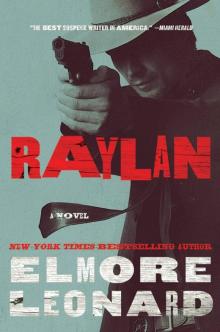 Raylan
Raylan Touch
Touch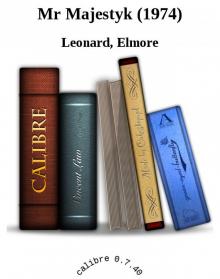 Mr Majestyk
Mr Majestyk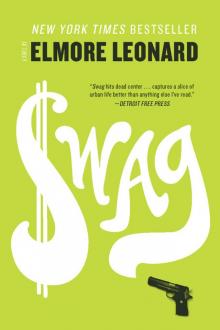 Swag
Swag Road Dogs
Road Dogs La Brava
La Brava The Hot Kid
The Hot Kid Valdez Is Coming: A Novel
Valdez Is Coming: A Novel Be Cool
Be Cool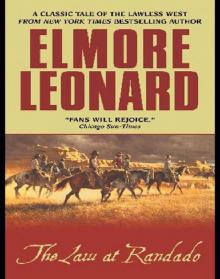 The Law at Randado
The Law at Randado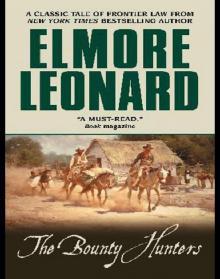 The Bounty Hunters
The Bounty Hunters When the Women Come Out to Dance
When the Women Come Out to Dance 310 to Yuma and Other Stories (1953)
310 to Yuma and Other Stories (1953)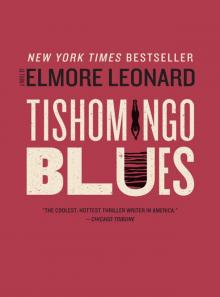 Tishomingo Blues
Tishomingo Blues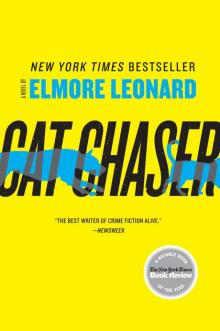 Cat Chaser
Cat Chaser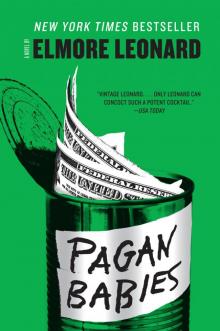 Pagan Babies
Pagan Babies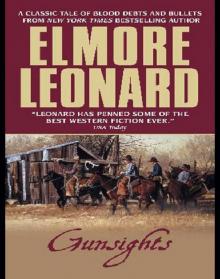 Elmore Leonard's Western Roundup #1
Elmore Leonard's Western Roundup #1 52 Pickup
52 Pickup Stick
Stick The Moonshine War
The Moonshine War Valdez Is Coming
Valdez Is Coming City Primeval
City Primeval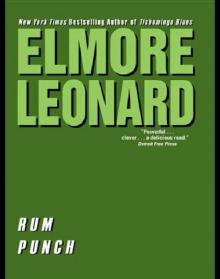 Rum Punch
Rum Punch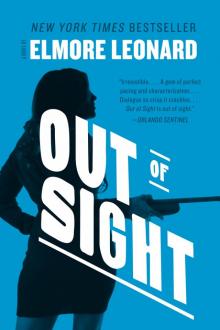 Out of Sight
Out of Sight Naked Came the Manatee (1996)
Naked Came the Manatee (1996) Killshot
Killshot Cuba Libre
Cuba Libre Forty Lashes Less One
Forty Lashes Less One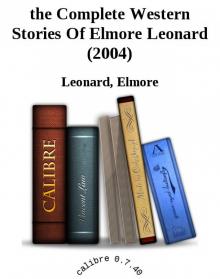 The Complete Western Stories of Elmore Leonard
The Complete Western Stories of Elmore Leonard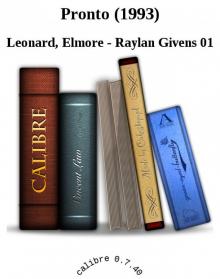 Pronto
Pronto Split Images
Split Images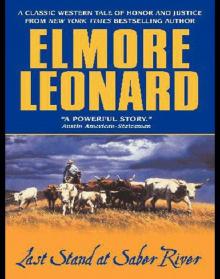 Last Stand at Saber River
Last Stand at Saber River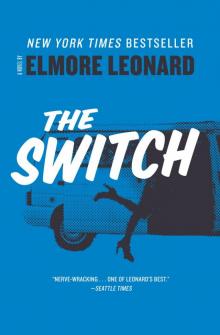 The Switch
The Switch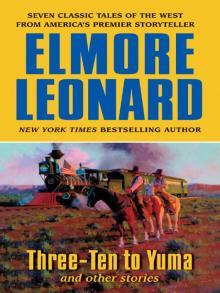 Three-Ten to Yuma and Other Stories
Three-Ten to Yuma and Other Stories Bandits
Bandits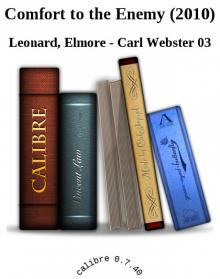 Comfort to the Enemy and Other Carl Webster Stories
Comfort to the Enemy and Other Carl Webster Stories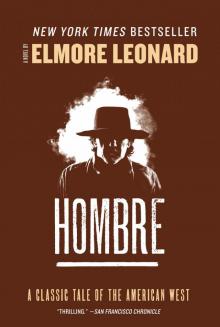 Hombre
Hombre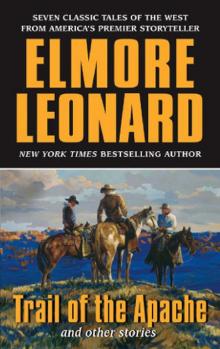 Trail of the Apache and Other Stories
Trail of the Apache and Other Stories LaBrava
LaBrava Gold Coast
Gold Coast Jackie Brown
Jackie Brown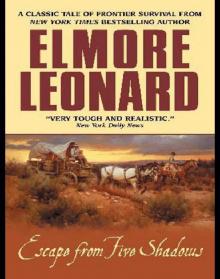 Escape From Five Shadows
Escape From Five Shadows Karen Makes out (1996)
Karen Makes out (1996)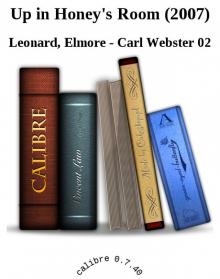 Up in Honey's Room
Up in Honey's Room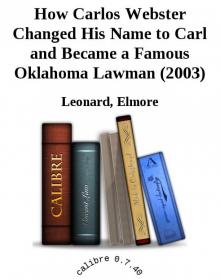 How Carlos Webster Changed His Name to Carl and Became a Famous Oklahoma Lawman (2003)
How Carlos Webster Changed His Name to Carl and Became a Famous Oklahoma Lawman (2003)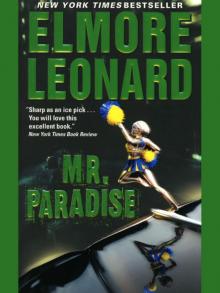 Mr. Paradise
Mr. Paradise The Hunted
The Hunted Freaky Deaky
Freaky Deaky Louly and Pretty Boy (Ss)
Louly and Pretty Boy (Ss)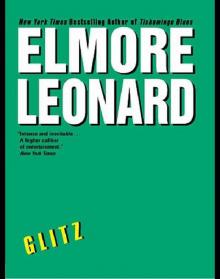 Glitz
Glitz A Coyote's in the House
A Coyote's in the House The Big Bounce jr-1
The Big Bounce jr-1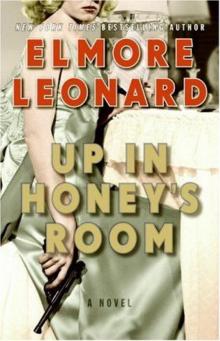 Up in Honey's Room cw-2
Up in Honey's Room cw-2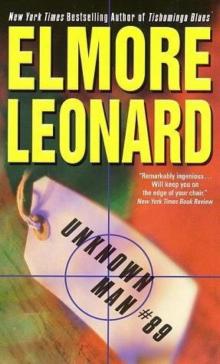 Unknown Man #89 jr-3
Unknown Man #89 jr-3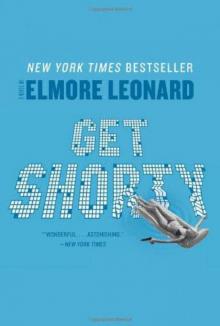 Get Shorty: A Novel cp-1
Get Shorty: A Novel cp-1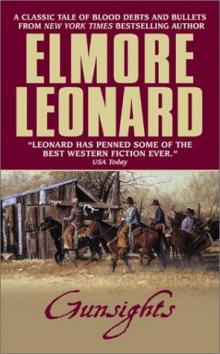 Gunsights
Gunsights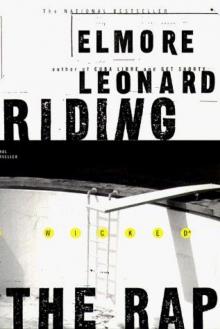 Riding the Rap rg-2
Riding the Rap rg-2